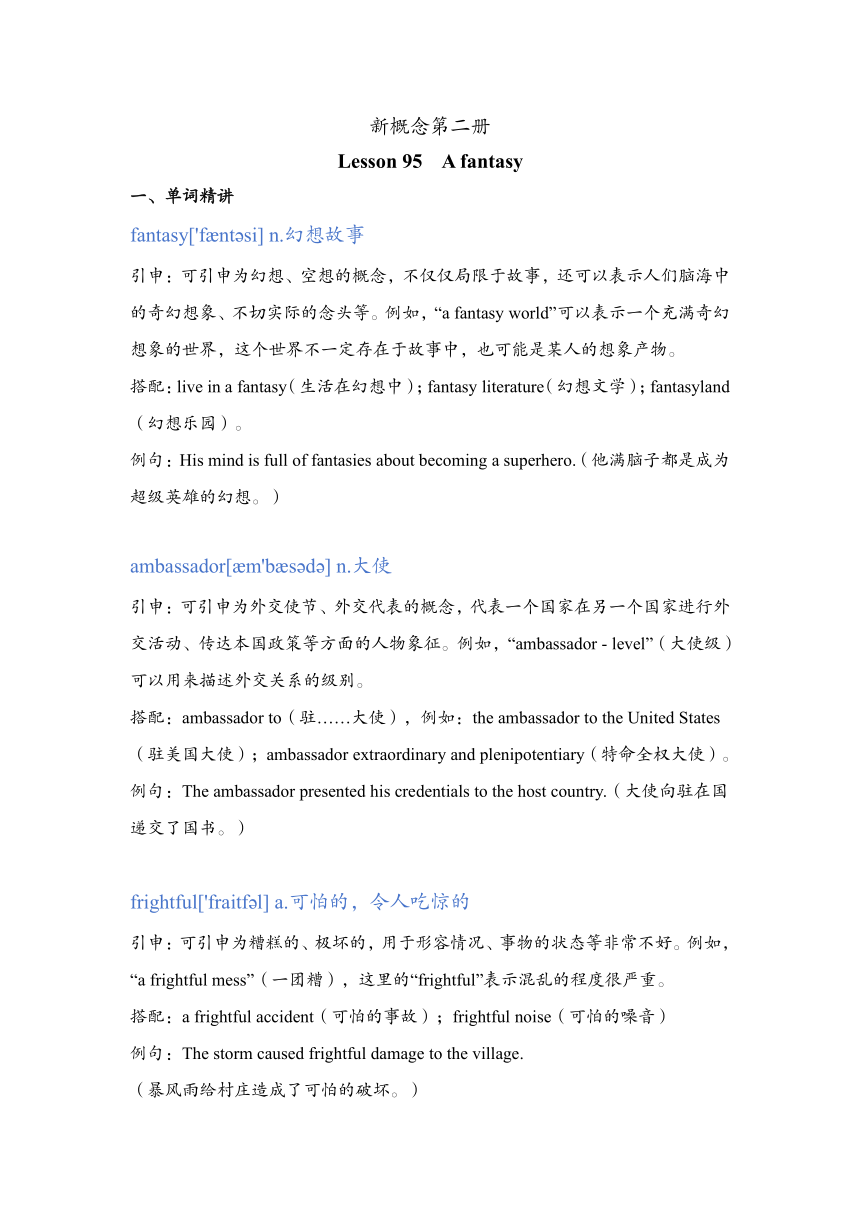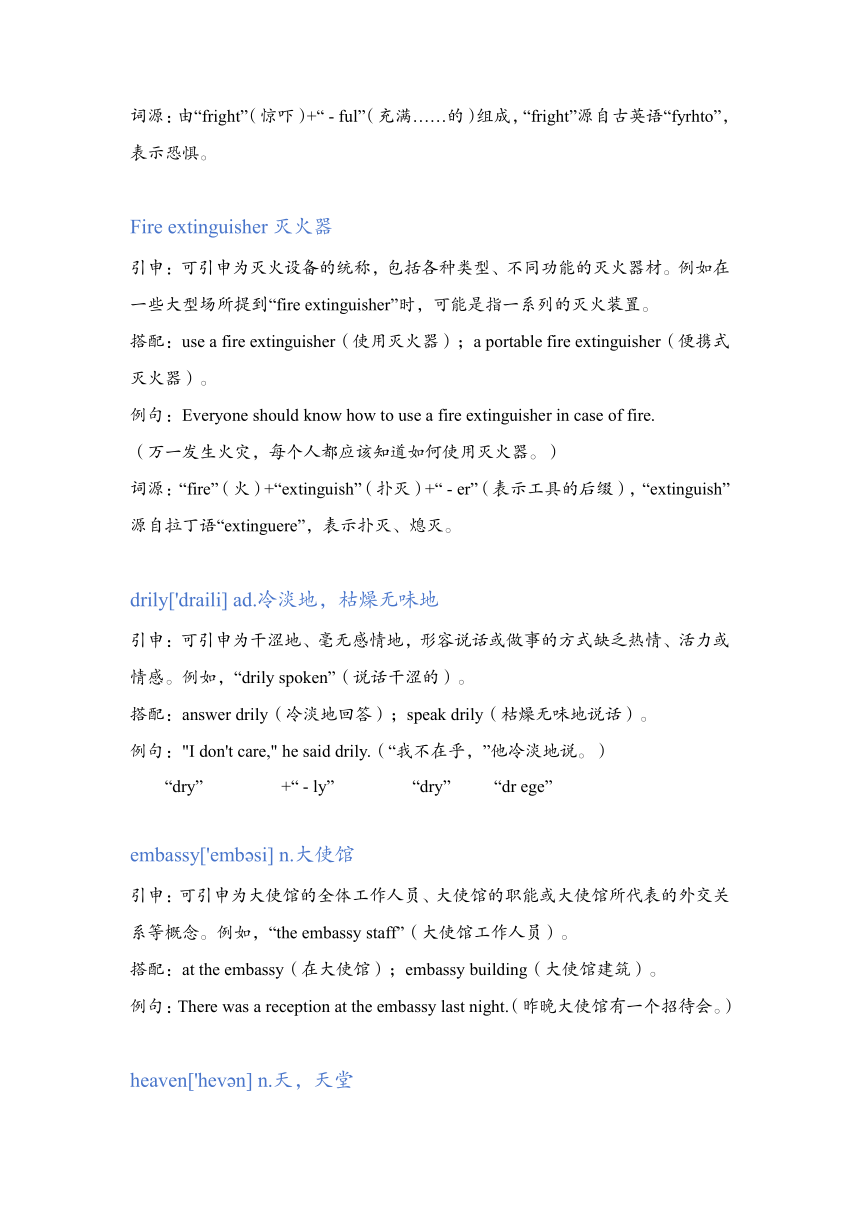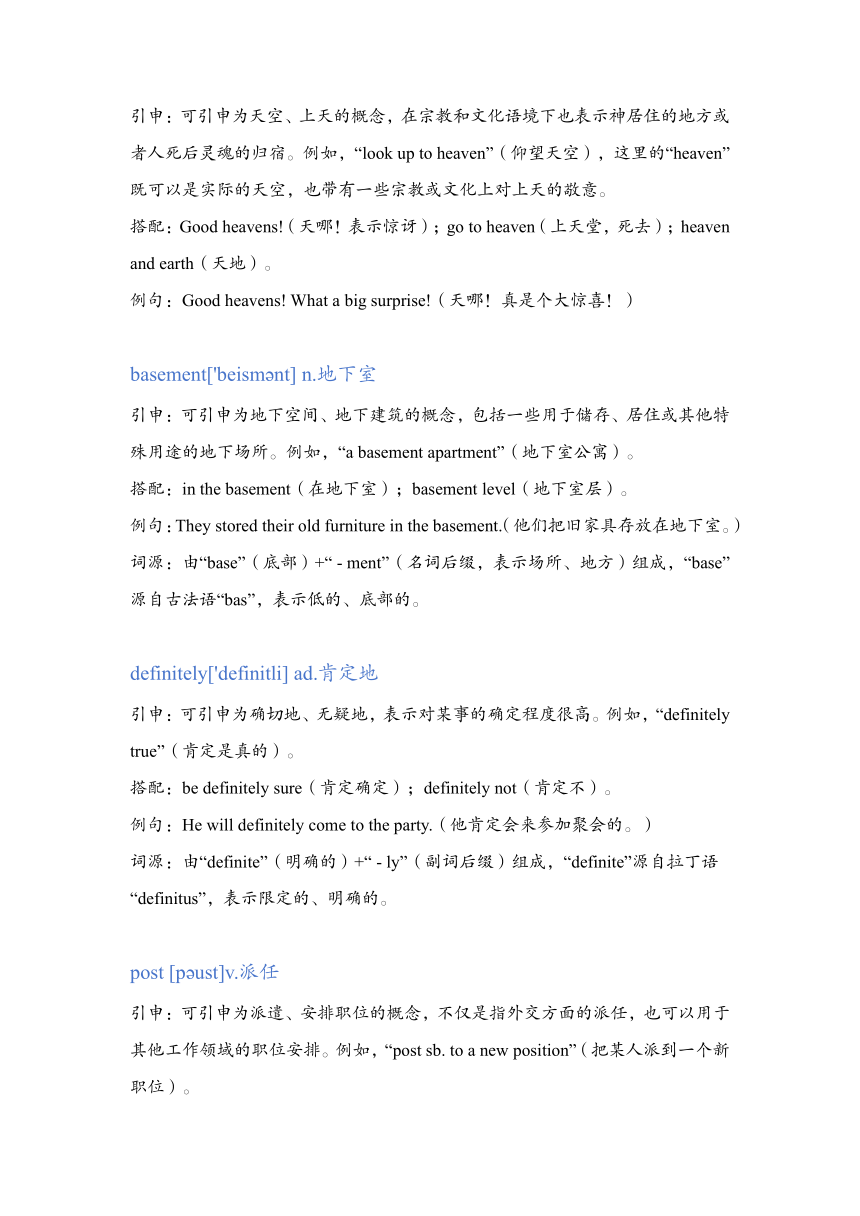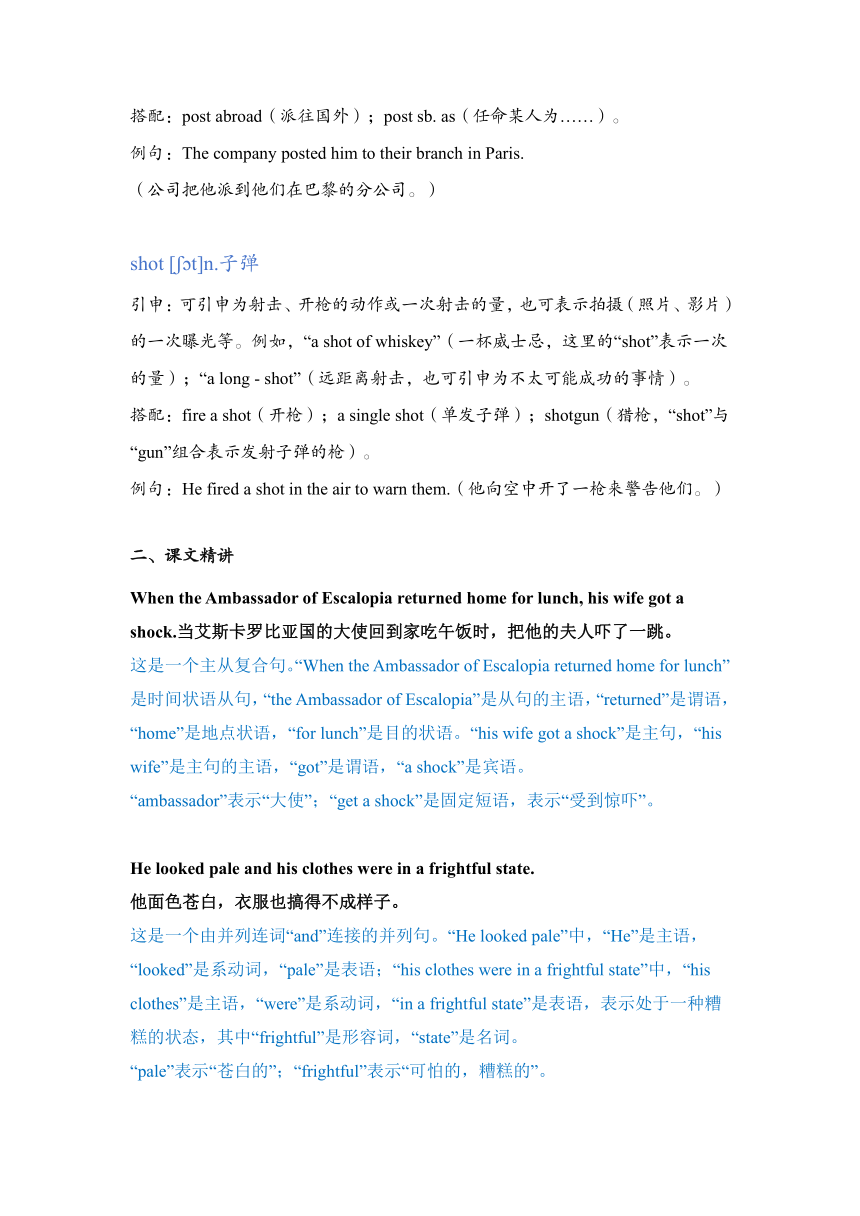新概念第二册Lesson 95 A fantasy讲义
文档属性
| 名称 | 新概念第二册Lesson 95 A fantasy讲义 |  | |
| 格式 | docx | ||
| 文件大小 | 126.0KB | ||
| 资源类型 | 教案 | ||
| 版本资源 | 新概念英语 | ||
| 科目 | 英语 | ||
| 更新时间 | 2024-11-26 09:10:09 | ||
图片预览




文档简介
新概念第二册
Lesson 95 A fantasy
单词精讲
fantasy['f nt si] n.幻想故事
引申:可引申为幻想、空想的概念,不仅仅局限于故事,还可以表示人们脑海中的奇幻想象、不切实际的念头等。例如,“a fantasy world”可以表示一个充满奇幻想象的世界,这个世界不一定存在于故事中,也可能是某人的想象产物。
搭配:live in a fantasy(生活在幻想中);fantasy literature(幻想文学);fantasyland(幻想乐园)。
例句:His mind is full of fantasies about becoming a superhero.(他满脑子都是成为超级英雄的幻想。)
ambassador[ m'b s d ] n.大使
引申:可引申为外交使节、外交代表的概念,代表一个国家在另一个国家进行外交活动、传达本国政策等方面的人物象征。例如,“ambassador - level”(大使级)可以用来描述外交关系的级别。
搭配:ambassador to(驻……大使),例如:the ambassador to the United States(驻美国大使);ambassador extraordinary and plenipotentiary(特命全权大使)。
例句:The ambassador presented his credentials to the host country.(大使向驻在国递交了国书。)
frightful['fraitf l] a.可怕的,令人吃惊的
引申:可引申为糟糕的、极坏的,用于形容情况、事物的状态等非常不好。例如,“a frightful mess”(一团糟),这里的“frightful”表示混乱的程度很严重。
搭配:a frightful accident(可怕的事故);frightful noise(可怕的噪音)
例句:The storm caused frightful damage to the village.
(暴风雨给村庄造成了可怕的破坏。)
词源:由“fright”(惊吓)+“ - ful”(充满……的)组成,“fright”源自古英语“fyrhto”,表示恐惧。
Fire extinguisher灭火器
引申:可引申为灭火设备的统称,包括各种类型、不同功能的灭火器材。例如在一些大型场所提到“fire extinguisher”时,可能是指一系列的灭火装置。
搭配:use a fire extinguisher(使用灭火器);a portable fire extinguisher(便携式灭火器)。
例句:Everyone should know how to use a fire extinguisher in case of fire.
(万一发生火灾,每个人都应该知道如何使用灭火器。)
词源:“fire”(火)+“extinguish”(扑灭)+“ - er”(表示工具的后缀),“extinguish”源自拉丁语“extinguere”,表示扑灭、熄灭。
drily['draili] ad.冷淡地,枯燥无味地
引申:可引申为干涩地、毫无感情地,形容说话或做事的方式缺乏热情、活力或情感。例如,“drily spoken”(说话干涩的)。
搭配:answer drily(冷淡地回答);speak drily(枯燥无味地说话)。
例句:"I don't care," he said drily.(“我不在乎,”他冷淡地说。)
词源:由“dry”(干燥的,冷淡的)+“ - ly”(副词后缀)组成,“dry”源自古英语“dr ege”。
embassy['emb si] n.大使馆
引申:可引申为大使馆的全体工作人员、大使馆的职能或大使馆所代表的外交关系等概念。例如,“the embassy staff”(大使馆工作人员)。
搭配:at the embassy(在大使馆);embassy building(大使馆建筑)。
例句:There was a reception at the embassy last night.(昨晚大使馆有一个招待会。)
heaven['hev n] n.天,天堂
引申:可引申为天空、上天的概念,在宗教和文化语境下也表示神居住的地方或者人死后灵魂的归宿。例如,“look up to heaven”(仰望天空),这里的“heaven”既可以是实际的天空,也带有一些宗教或文化上对上天的敬意。
搭配:Good heavens!(天哪!表示惊讶);go to heaven(上天堂,死去);heaven and earth(天地)。
例句:Good heavens! What a big surprise!(天哪!真是个大惊喜!)
basement['beism nt] n.地下室
引申:可引申为地下空间、地下建筑的概念,包括一些用于储存、居住或其他特殊用途的地下场所。例如,“a basement apartment”(地下室公寓)。
搭配:in the basement(在地下室);basement level(地下室层)。
例句:They stored their old furniture in the basement.(他们把旧家具存放在地下室。)
词源:由“base”(底部)+“ - ment”(名词后缀,表示场所、地方)组成,“base”源自古法语“bas”,表示低的、底部的。
definitely['definitli] ad.肯定地
引申:可引申为确切地、无疑地,表示对某事的确定程度很高。例如,“definitely true”(肯定是真的)。
搭配:be definitely sure(肯定确定);definitely not(肯定不)。
例句:He will definitely come to the party.(他肯定会来参加聚会的。)
词源:由“definite”(明确的)+“ - ly”(副词后缀)组成,“definite”源自拉丁语“definitus”,表示限定的、明确的。
post [p ust]v.派任
引申:可引申为派遣、安排职位的概念,不仅是指外交方面的派任,也可以用于其他工作领域的职位安排。例如,“post sb. to a new position”(把某人派到一个新职位)。
搭配:post abroad(派往国外);post sb. as(任命某人为……)。
例句:The company posted him to their branch in Paris.
(公司把他派到他们在巴黎的分公司。)
shot [ t]n.子弹
引申:可引申为射击、开枪的动作或一次射击的量,也可表示拍摄(照片、影片)的一次曝光等。例如,“a shot of whiskey”(一杯威士忌,这里的“shot”表示一次的量);“a long - shot”(远距离射击,也可引申为不太可能成功的事情)。
搭配:fire a shot(开枪);a single shot(单发子弹);shotgun(猎枪,“shot”与“gun”组合表示发射子弹的枪)。
例句:He fired a shot in the air to warn them.(他向空中开了一枪来警告他们。)
课文精讲
When the Ambassador of Escalopia returned home for lunch, his wife got a shock.当艾斯卡罗比亚国的大使回到家吃午饭时,把他的夫人吓了一跳。
这是一个主从复合句。“When the Ambassador of Escalopia returned home for lunch”是时间状语从句,“the Ambassador of Escalopia”是从句的主语,“returned”是谓语,“home”是地点状语,“for lunch”是目的状语。“his wife got a shock”是主句,“his wife”是主句的主语,“got”是谓语,“a shock”是宾语。
“ambassador”表示“大使”;“get a shock”是固定短语,表示“受到惊吓”。
He looked pale and his clothes were in a frightful state.
他面色苍白,衣服也搞得不成样子。
这是一个由并列连词“and”连接的并列句。“He looked pale”中,“He”是主语,“looked”是系动词,“pale”是表语;“his clothes were in a frightful state”中,“his clothes”是主语,“were”是系动词,“in a frightful state”是表语,表示处于一种糟糕的状态,其中“frightful”是形容词,“state”是名词。
“pale”表示“苍白的”;“frightful”表示“可怕的,糟糕的”。
'What has happened ' she asked. How did your clothes get into such a mess
“发生了什么事?”她问,“你的衣服怎么搞得一塌糊涂?”
get into a mess 搞得这样糟
When she returned from the market, the children had got the room into a terrible mess.
Why was her hair in such a mess
这是两个直接引语的句子。“What has happened ”是特殊疑问句,在句子中“what”是疑问代词作主语,“has happened”是谓语,使用现在完成时,表示已经发生的事情。“she asked”是主句,“she”是主语,“asked”是谓语。“How did your clothes get into such a mess ”也是特殊疑问句,“how”是疑问副词,“your clothes”是主语,“did...get”是谓语,使用一般过去时的疑问句形式,“into such a mess”是介词短语作状语,表示进入这样一种混乱的状态。
'A fire extinguisher, my dear,' answered the Ambassador drily. '
“灭火器弄的,亲爱的,”大使冷冷地回答
这是两个直接引语的句子。“A fire extinguisher, my dear,”是一个省略句,完整形式可能是“It was a fire extinguisher, my dear.”,“answered the Ambassador drily”是主句,“the Ambassador”是主语,“answered”是谓语,“drily”是副词作状语,表示冷淡地、枯燥地。
University students set the Embassy on fire this morning.
“今天上午大学生们放火点着了大使馆。”
set…on fire 放火,使……燃烧,放火烧……
In 1834, someone set the Houses of Parliament on fire.
'Good heavens!' exclaimed his wife. 'And where were you at the time '
“天啊!”他的夫人惊叫,“那你当时在什么地方?”
这是两个直接引语的句子。“Good heavens!”是感叹句,表示惊讶等情绪。“exclaimed his wife”是主句,“his wife”是主语,“exclaimed”是谓语。“And where were you at the time ”是特殊疑问句,“where”是疑问副词,“you”是主语,“were”是系动词,“at the time”是时间状语。
“exclaim”表示“呼喊,惊叫”。
'I was in my office as usual,' answered the Ambassador.
“我和往常一样,在办公室里,”大使回答说。
“I was in my office as usual,”是一个简单句,“I”是主语,“was”是系动词,“in my office”是表语,“as usual”是状语。“answered the Ambassador”是主句,“the Ambassador”是主语,“answered”是谓语。
The fire broke out in the basement.地下室突然着火
break out (火灾、战争等)突然发生,爆发
When the fire broke out in the ship, Sally was frightened out of her wits.
I went down immediately, of course, and that fool, Horst, aimed a fire extinguisher at me.
我当然马上下去了,但那个傻瓜霍斯特把灭火器对准了我。
aim…at 用……瞄准
The Ambassador's wife went on asking questions, when she suddenly noticed a big hole in her husband's hat.
大使夫人继续提出问题,她突然又发现丈夫的帽子上有个洞。
这是一个主从复合句。“The Ambassador's wife went on asking questions”是主句,“The Ambassador's wife”是主语,“went on asking”是谓语,表示继续做某事,“questions”是宾语。“when she suddenly noticed a big hole in her husband's hat”是时间状语从句,“she”是主语,“suddenly noticed”是谓语,“a big hole”是宾语,“in her husband's hat”是介词短语作后置定语,用于修饰“a big hole”。
“go on doing sth.”表示“继续做某事”;“notice”表示“注意到”。
And how can you explain that ' she asked.“那么你对那又作何解释呢?”她问。
这是一个直接引语的句子。“And how can you explain that ”是特殊疑问句,“how”是疑问副词,“you”是主语,“can explain”是谓语,“that”是宾语。“she asked”是主句,“she”是主语,“asked”是谓语。
“explain”表示“解释”。
'Oh, that,' said the Ambassador. '“那个嘛,”大使说,
这是由多个句子组成的一段话,都是直接引语。
Someone fired a shot through my office window.
“有人向我办公室窗户开了一枪。
fire v. 发射(枪、弹等)
When the prisoner of war tried to escape, a guard fired a gun at him.
A young man fired on the British Ambassador to Japan.
一位年轻人向英国驻日本大使开了枪。
Accurate, don't you think Fortunately, I wasn't wearing it at the time. If I had been, I would not have been able to get home for lunch.'
真够准的,是不是?幸亏我当时没戴帽子。如果真戴着它,我现在就不能回家来吃午饭了。”
“Accurate, don't you think ”是一个省略句,完整形式可能是“It was accurate, don't you think ”,是一个反义疑问句,“Accurate”是形容词作表语,“don't you think”是附加疑问句。“Fortunately”是副词作状语,表示幸运地,“I”是主语,“wasn't wearing”是谓语,表示没有戴着,“it”是宾语,“at the time”是时间状语。“If I had been, I would not have been able to get home for lunch.”是一个虚拟条件句,“If I had been”是条件状语从句,表示与过去事实相反的假设,“I”是主语,“had been”是谓语,表示戴着(帽子),“I would not have been able to get home for lunch”是主句,表示在这种假设下的结果,“I”是主语,“would not have been able to get home for lunch”是谓语,表示将不能够回家吃午饭。
Lesson 95 A fantasy
单词精讲
fantasy['f nt si] n.幻想故事
引申:可引申为幻想、空想的概念,不仅仅局限于故事,还可以表示人们脑海中的奇幻想象、不切实际的念头等。例如,“a fantasy world”可以表示一个充满奇幻想象的世界,这个世界不一定存在于故事中,也可能是某人的想象产物。
搭配:live in a fantasy(生活在幻想中);fantasy literature(幻想文学);fantasyland(幻想乐园)。
例句:His mind is full of fantasies about becoming a superhero.(他满脑子都是成为超级英雄的幻想。)
ambassador[ m'b s d ] n.大使
引申:可引申为外交使节、外交代表的概念,代表一个国家在另一个国家进行外交活动、传达本国政策等方面的人物象征。例如,“ambassador - level”(大使级)可以用来描述外交关系的级别。
搭配:ambassador to(驻……大使),例如:the ambassador to the United States(驻美国大使);ambassador extraordinary and plenipotentiary(特命全权大使)。
例句:The ambassador presented his credentials to the host country.(大使向驻在国递交了国书。)
frightful['fraitf l] a.可怕的,令人吃惊的
引申:可引申为糟糕的、极坏的,用于形容情况、事物的状态等非常不好。例如,“a frightful mess”(一团糟),这里的“frightful”表示混乱的程度很严重。
搭配:a frightful accident(可怕的事故);frightful noise(可怕的噪音)
例句:The storm caused frightful damage to the village.
(暴风雨给村庄造成了可怕的破坏。)
词源:由“fright”(惊吓)+“ - ful”(充满……的)组成,“fright”源自古英语“fyrhto”,表示恐惧。
Fire extinguisher灭火器
引申:可引申为灭火设备的统称,包括各种类型、不同功能的灭火器材。例如在一些大型场所提到“fire extinguisher”时,可能是指一系列的灭火装置。
搭配:use a fire extinguisher(使用灭火器);a portable fire extinguisher(便携式灭火器)。
例句:Everyone should know how to use a fire extinguisher in case of fire.
(万一发生火灾,每个人都应该知道如何使用灭火器。)
词源:“fire”(火)+“extinguish”(扑灭)+“ - er”(表示工具的后缀),“extinguish”源自拉丁语“extinguere”,表示扑灭、熄灭。
drily['draili] ad.冷淡地,枯燥无味地
引申:可引申为干涩地、毫无感情地,形容说话或做事的方式缺乏热情、活力或情感。例如,“drily spoken”(说话干涩的)。
搭配:answer drily(冷淡地回答);speak drily(枯燥无味地说话)。
例句:"I don't care," he said drily.(“我不在乎,”他冷淡地说。)
词源:由“dry”(干燥的,冷淡的)+“ - ly”(副词后缀)组成,“dry”源自古英语“dr ege”。
embassy['emb si] n.大使馆
引申:可引申为大使馆的全体工作人员、大使馆的职能或大使馆所代表的外交关系等概念。例如,“the embassy staff”(大使馆工作人员)。
搭配:at the embassy(在大使馆);embassy building(大使馆建筑)。
例句:There was a reception at the embassy last night.(昨晚大使馆有一个招待会。)
heaven['hev n] n.天,天堂
引申:可引申为天空、上天的概念,在宗教和文化语境下也表示神居住的地方或者人死后灵魂的归宿。例如,“look up to heaven”(仰望天空),这里的“heaven”既可以是实际的天空,也带有一些宗教或文化上对上天的敬意。
搭配:Good heavens!(天哪!表示惊讶);go to heaven(上天堂,死去);heaven and earth(天地)。
例句:Good heavens! What a big surprise!(天哪!真是个大惊喜!)
basement['beism nt] n.地下室
引申:可引申为地下空间、地下建筑的概念,包括一些用于储存、居住或其他特殊用途的地下场所。例如,“a basement apartment”(地下室公寓)。
搭配:in the basement(在地下室);basement level(地下室层)。
例句:They stored their old furniture in the basement.(他们把旧家具存放在地下室。)
词源:由“base”(底部)+“ - ment”(名词后缀,表示场所、地方)组成,“base”源自古法语“bas”,表示低的、底部的。
definitely['definitli] ad.肯定地
引申:可引申为确切地、无疑地,表示对某事的确定程度很高。例如,“definitely true”(肯定是真的)。
搭配:be definitely sure(肯定确定);definitely not(肯定不)。
例句:He will definitely come to the party.(他肯定会来参加聚会的。)
词源:由“definite”(明确的)+“ - ly”(副词后缀)组成,“definite”源自拉丁语“definitus”,表示限定的、明确的。
post [p ust]v.派任
引申:可引申为派遣、安排职位的概念,不仅是指外交方面的派任,也可以用于其他工作领域的职位安排。例如,“post sb. to a new position”(把某人派到一个新职位)。
搭配:post abroad(派往国外);post sb. as(任命某人为……)。
例句:The company posted him to their branch in Paris.
(公司把他派到他们在巴黎的分公司。)
shot [ t]n.子弹
引申:可引申为射击、开枪的动作或一次射击的量,也可表示拍摄(照片、影片)的一次曝光等。例如,“a shot of whiskey”(一杯威士忌,这里的“shot”表示一次的量);“a long - shot”(远距离射击,也可引申为不太可能成功的事情)。
搭配:fire a shot(开枪);a single shot(单发子弹);shotgun(猎枪,“shot”与“gun”组合表示发射子弹的枪)。
例句:He fired a shot in the air to warn them.(他向空中开了一枪来警告他们。)
课文精讲
When the Ambassador of Escalopia returned home for lunch, his wife got a shock.当艾斯卡罗比亚国的大使回到家吃午饭时,把他的夫人吓了一跳。
这是一个主从复合句。“When the Ambassador of Escalopia returned home for lunch”是时间状语从句,“the Ambassador of Escalopia”是从句的主语,“returned”是谓语,“home”是地点状语,“for lunch”是目的状语。“his wife got a shock”是主句,“his wife”是主句的主语,“got”是谓语,“a shock”是宾语。
“ambassador”表示“大使”;“get a shock”是固定短语,表示“受到惊吓”。
He looked pale and his clothes were in a frightful state.
他面色苍白,衣服也搞得不成样子。
这是一个由并列连词“and”连接的并列句。“He looked pale”中,“He”是主语,“looked”是系动词,“pale”是表语;“his clothes were in a frightful state”中,“his clothes”是主语,“were”是系动词,“in a frightful state”是表语,表示处于一种糟糕的状态,其中“frightful”是形容词,“state”是名词。
“pale”表示“苍白的”;“frightful”表示“可怕的,糟糕的”。
'What has happened ' she asked. How did your clothes get into such a mess
“发生了什么事?”她问,“你的衣服怎么搞得一塌糊涂?”
get into a mess 搞得这样糟
When she returned from the market, the children had got the room into a terrible mess.
Why was her hair in such a mess
这是两个直接引语的句子。“What has happened ”是特殊疑问句,在句子中“what”是疑问代词作主语,“has happened”是谓语,使用现在完成时,表示已经发生的事情。“she asked”是主句,“she”是主语,“asked”是谓语。“How did your clothes get into such a mess ”也是特殊疑问句,“how”是疑问副词,“your clothes”是主语,“did...get”是谓语,使用一般过去时的疑问句形式,“into such a mess”是介词短语作状语,表示进入这样一种混乱的状态。
'A fire extinguisher, my dear,' answered the Ambassador drily. '
“灭火器弄的,亲爱的,”大使冷冷地回答
这是两个直接引语的句子。“A fire extinguisher, my dear,”是一个省略句,完整形式可能是“It was a fire extinguisher, my dear.”,“answered the Ambassador drily”是主句,“the Ambassador”是主语,“answered”是谓语,“drily”是副词作状语,表示冷淡地、枯燥地。
University students set the Embassy on fire this morning.
“今天上午大学生们放火点着了大使馆。”
set…on fire 放火,使……燃烧,放火烧……
In 1834, someone set the Houses of Parliament on fire.
'Good heavens!' exclaimed his wife. 'And where were you at the time '
“天啊!”他的夫人惊叫,“那你当时在什么地方?”
这是两个直接引语的句子。“Good heavens!”是感叹句,表示惊讶等情绪。“exclaimed his wife”是主句,“his wife”是主语,“exclaimed”是谓语。“And where were you at the time ”是特殊疑问句,“where”是疑问副词,“you”是主语,“were”是系动词,“at the time”是时间状语。
“exclaim”表示“呼喊,惊叫”。
'I was in my office as usual,' answered the Ambassador.
“我和往常一样,在办公室里,”大使回答说。
“I was in my office as usual,”是一个简单句,“I”是主语,“was”是系动词,“in my office”是表语,“as usual”是状语。“answered the Ambassador”是主句,“the Ambassador”是主语,“answered”是谓语。
The fire broke out in the basement.地下室突然着火
break out (火灾、战争等)突然发生,爆发
When the fire broke out in the ship, Sally was frightened out of her wits.
I went down immediately, of course, and that fool, Horst, aimed a fire extinguisher at me.
我当然马上下去了,但那个傻瓜霍斯特把灭火器对准了我。
aim…at 用……瞄准
The Ambassador's wife went on asking questions, when she suddenly noticed a big hole in her husband's hat.
大使夫人继续提出问题,她突然又发现丈夫的帽子上有个洞。
这是一个主从复合句。“The Ambassador's wife went on asking questions”是主句,“The Ambassador's wife”是主语,“went on asking”是谓语,表示继续做某事,“questions”是宾语。“when she suddenly noticed a big hole in her husband's hat”是时间状语从句,“she”是主语,“suddenly noticed”是谓语,“a big hole”是宾语,“in her husband's hat”是介词短语作后置定语,用于修饰“a big hole”。
“go on doing sth.”表示“继续做某事”;“notice”表示“注意到”。
And how can you explain that ' she asked.“那么你对那又作何解释呢?”她问。
这是一个直接引语的句子。“And how can you explain that ”是特殊疑问句,“how”是疑问副词,“you”是主语,“can explain”是谓语,“that”是宾语。“she asked”是主句,“she”是主语,“asked”是谓语。
“explain”表示“解释”。
'Oh, that,' said the Ambassador. '“那个嘛,”大使说,
这是由多个句子组成的一段话,都是直接引语。
Someone fired a shot through my office window.
“有人向我办公室窗户开了一枪。
fire v. 发射(枪、弹等)
When the prisoner of war tried to escape, a guard fired a gun at him.
A young man fired on the British Ambassador to Japan.
一位年轻人向英国驻日本大使开了枪。
Accurate, don't you think Fortunately, I wasn't wearing it at the time. If I had been, I would not have been able to get home for lunch.'
真够准的,是不是?幸亏我当时没戴帽子。如果真戴着它,我现在就不能回家来吃午饭了。”
“Accurate, don't you think ”是一个省略句,完整形式可能是“It was accurate, don't you think ”,是一个反义疑问句,“Accurate”是形容词作表语,“don't you think”是附加疑问句。“Fortunately”是副词作状语,表示幸运地,“I”是主语,“wasn't wearing”是谓语,表示没有戴着,“it”是宾语,“at the time”是时间状语。“If I had been, I would not have been able to get home for lunch.”是一个虚拟条件句,“If I had been”是条件状语从句,表示与过去事实相反的假设,“I”是主语,“had been”是谓语,表示戴着(帽子),“I would not have been able to get home for lunch”是主句,表示在这种假设下的结果,“I”是主语,“would not have been able to get home for lunch”是谓语,表示将不能够回家吃午饭。
同课章节目录
